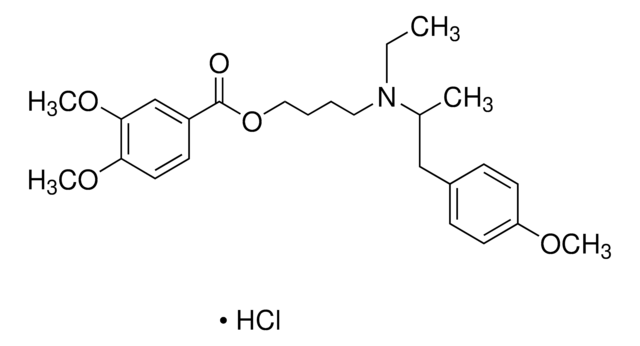5.09911
RNA Polymerase I Inhibitor II, BMH-21
Sinónimos:
RNA Polymerase I Inhibitor II, BMH-21, BMH21, rRNA Transcription Inhibitor II, N-(2-(Dimethylamino)ethyl)-12-oxo-12H-benzo[g]pyrido[2,1-b]quinazoline-4-carboxamide, N-(2-(Dimethylamino)ethyl)-12-oxo-12H-benzo[g]pyrido[2,1-b]quinazoline-4-carboxamide, BMH21, rRNA Transcription Inhibitor II
About This Item
Productos recomendados
assay
≥98% (HPLC)
Quality Level
form
powder
manufacturer/tradename
Calbiochem®
storage condition
OK to freeze
protect from light
color
orange-yellow
solubility
DMSO: 1 mg/mL
5% acetic acid: 25 mg/mL
storage temp.
2-8°C
General description
Please note that the molecular weight for this compound is batch-specific due to variable water content.
Biochem/physiol Actions
rDNA
Packaging
Warning
Reconstitution
Other Notes
Peltonen, K., et al. 2010. PLoS One5, e12996.
Legal Information
signalword
Warning
hcodes
Hazard Classifications
Acute Tox. 4 Oral
Storage Class
11 - Combustible Solids
wgk_germany
WGK 3
flash_point_f
Not applicable
flash_point_c
Not applicable
Certificados de análisis (COA)
Busque Certificados de análisis (COA) introduciendo el número de lote del producto. Los números de lote se encuentran en la etiqueta del producto después de las palabras «Lot» o «Batch»
¿Ya tiene este producto?
Encuentre la documentación para los productos que ha comprado recientemente en la Biblioteca de documentos.
Nuestro equipo de científicos tiene experiencia en todas las áreas de investigación: Ciencias de la vida, Ciencia de los materiales, Síntesis química, Cromatografía, Analítica y muchas otras.
Póngase en contacto con el Servicio técnico
